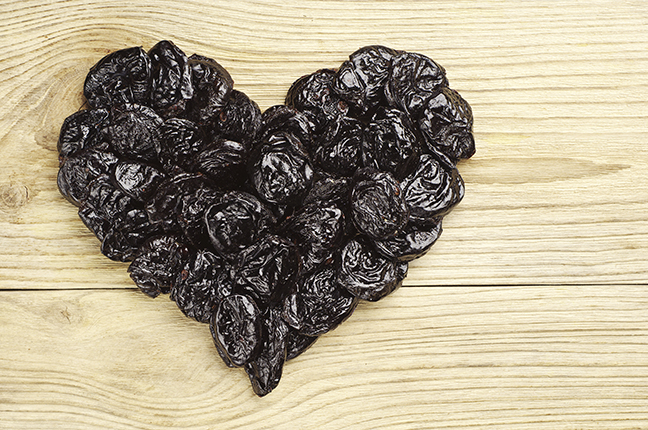We used to call them prunes – at least until popular perception made the word prune synonymous with “laxative.” Since the growers, packagers and marketers want you to know that dried plum are good for much more than just constipation relief – the industry – especially in the US has taken to calling them “dried plums.”
The push to re-label them has become so ubiquitous and has been so effective that future dictionaries may start referring to the word “prune” as archaic.
Here then, are the latest findings about dried plums.
A diet containing dried plums is linked to lower risk of colon cancer in rats in new research by from Texas A&M University and the University of North Carolina. Dried plums appear to promote retention of beneficial microbiota and microbial metabolism throughout the colon, and, by doing so, reduce the incidence of colon cancer in rats.
“While additional research is needed, the results from this study are exciting because they suggest that eating dried plums may be a viable nutrition strategy to help prevent colorectal cancer,” says Nancy Turner, PhD, Research Professor, Department of Nutrition and Food Science, Texas A&M University. Colon cancer is the third leading cause of cancer-related deaths in the United States when men and women are considered separately, and the second leading cause when both sexes are combined.
A daily serving of dried plums is linked to preventing bone loss in postmenopausal women. Previous studies discovered that eating 100 grams (two servings; about 8-10 dried plums) of dried plums for one year was associated with increased bone mineral density (BMD) and improved indices of bone turnover in postmenopausal women. A current study indicated that a single serving of dried plums may be as effective in preventing bone loss in older, osteopenic postmenopausal women.
“A dried fruit that you can incorporate into your diet as a convenient snack that may help to prevent further bone loss is an incredible finding,” says Shirin Hooshmand, PhD, Researcher and Assistant Professor, Department of Exercise and Nutritional Sciences at San Diego State University. Dried plums are effective in increasing antioxidant capacity in the body, which may help reduce disease risk in smokers who are struggling to quit.
When eaten frequently, dried plums contribute to the overall intake of dietary fiber and many important vitamins, minerals and phenolic compounds, which function as antioxidants. Research results presented at the conference discovered that dried plums are effective in increasing antioxidant capacity for both smokers and nonsmokers and may give smokers some protection against oxidative stress associated with cigarette smoking.
“Choosing dried plums as a snack instead of a less nutritious option may be beneficial in reducing disease risks in smokers that are struggling to quit,” says Mark Kern, PhD, RD, CSSD, Researcher and Professor, Department of Exercise and Nutritional Sciences at San Diego State University.
The same study in smokers conducted by researchers at San Diego State University discovered that eating dried plums may have a positive role in preventing the emphysema associated with smoking cigarettes. Research linked eating dried plums before smoking a cigarette with decreased signs of inflammation in lung tissue.









